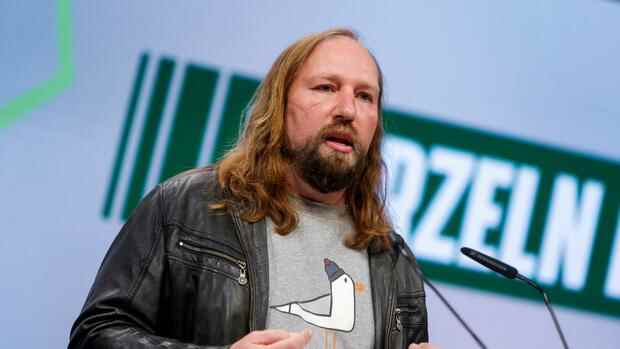The chairman of the Bundestag’s Europe Committee accuses Chancellor Scholz of hesitation.
(Photo: Reuters)
Berlin In the discussion about the delivery of heavy weapons to Ukraine, Green Party politician Anton Hofreiter reiterated his criticism of Chancellor Olaf Scholz’s course. In an interview with the “Frankfurter Allgemeine Sonntagszeitung”, the chairman of the Bundestag’s Europe Committee again accused Scholz of hesitation and compared the style of the SPD chancellor to that of his predecessor, Angela Merkel (CDU).
“Scholz is very similar to Merkel, that’s the problem,” said Hofreiter. The difference to Merkel is that “all the crises that she approached too hesitantly were slowly developing crises” – he cited the climate crisis as an example.
“We only feel the consequences of Merkel’s hesitation with a time lag. But decisions in war have to be made within days, better still within hours,” says Hofreiter. And the style of Merkel and Scholz does not fit in there.
However, Hofreiter also criticized CDU/CSU parliamentary group leader Friedrich Merz because of the Union’s planned Bundestag application for arms deliveries. The largest opposition faction is also hoping for the approval of coalition politicians from the Greens and the FDP, who have spoken out in favor of the delivery of heavy weapons.
Top jobs of the day
Find the best jobs now and
be notified by email.
“I don’t think much of using such things for small-scale party-political gains,” stressed Hofreiter. If the Union really wants to ensure that heavy weapons are delivered, “then it should do everything possible to increase the pressure – and not make party-politically motivated proposals, which are always rejected by government majorities”.
Hofreiter: No danger for the traffic light
Hofreiter summed it up: “We have a chancellor who is too hesitant at the moment, and an opposition leader who does not have the interests of the whole in mind, but rather small-scale politics. Both are a problem.” According to Hofreiter, there is no danger for the red-green-yellow coalition. “I see a struggle in the coalition in an extremely difficult situation for the right actions.”
Criticism is also voiced from the FDP. The deputy FDP chairman Wolfgang Kubicki opened the federal party conference of the Liberals with an attack on the coalition partner SPD. With a view to the international criticism of Germany’s hesitant attitude when it came to supplying arms to Ukraine, he said: “The image that many representatives of the largest governing party are presenting in front of the eyes of the world public is not one that can satisfy us as a coalition partner. “
Kubicki warned: “We simply don’t have time to deal with the ideological ballast of the past.” Concrete and effective military aid for Ukraine is needed. “And some say that the decisive will to lead is also missing at the moment.”
Kubicki saw Germany as ill-equipped for the challenges of the future. “The Russian war of aggression and its consequences have relentlessly revealed that the Federal Republic has not made a number of fundamental decisions over the past decade and a half,” said the Vice President of the Bundestag. “It is now becoming apparent that Germany has sat back for too long, has been caught in a political twilight sleep for far too long.”
FDP leader and Federal Minister of Finance Christian Lindner, on the other hand, gave Chancellor Scholz backing in the dispute over arms deliveries to Ukraine. “The Chancellor has the confidence of the FDP and also of their parliamentary group in the German Bundestag,” said Lindner, who was digitally connected to the federal party conference of the FDP in Berlin on Saturday from Washington.
Lindner speaks out against blanket criticism
But it is also clear: “Ukraine needs military aid and heavy weapons.” The situation requires responsible and serious decisions. General criticism of the Federal Chancellor cannot be a matter for the FDP, said Lindner, who criticized the Union for “partisan gymnastics”.
Ukraine was attacked by Russian President Vladimir Putin for “making value decisions towards Europe” and thereby steering away from Putin’s authoritarian system. “In Ukraine, there is also a fight for the values that are important to us,” said Lindner. “Therefore, Ukraine must win this war, and Ukraine will win this war,” said Lindner.
More: “The day that robbed me of my illusions” – How the war changed the young generation
